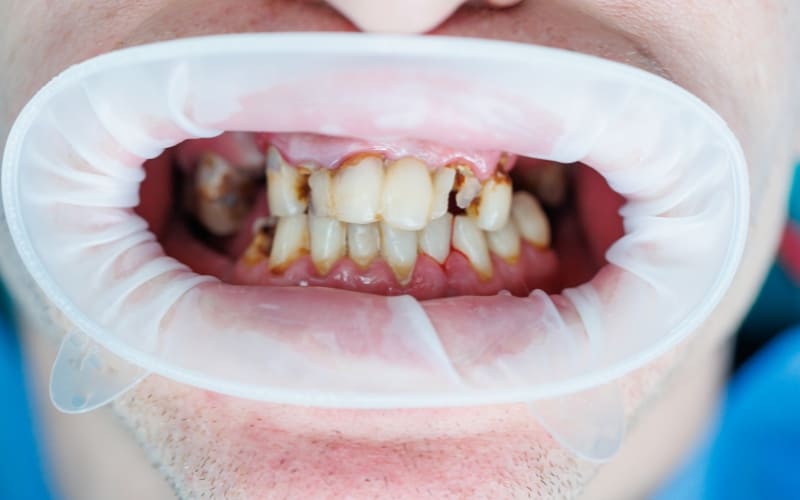Maintaining oral health is pivotal for overall well-being. Poor oral health can lead to a cascade of issues, affecting not just the mouth but also the entire body. Symptoms of poor oral health, like gum disease and tooth decay, can exacerbate systemic conditions such as cardiovascular disease and diabetes. The mouth serves as a gateway for bacteria, which can spread and contribute to inflammation and infection in other parts of the body. Therefore, regular dental care and hygiene practices are vital not only for a healthy smile but also for safeguarding against potential health complications.
Symptoms of Poor Oral Health
1. Gum Problems:
1. Gingivitis: Inflammation of the gums characterized by redness, swelling, and sometimes bleeding during brushing or flossing.
2. Periodontitis: It is an advanced gum disease where the inflammation extends to the supporting structures of the teeth, leading to bone loss and eventual tooth loss if untreated.
3. Receding Gums: Gum tissue pulling away from the teeth, exposing the tooth roots and increasing susceptibility to decay and sensitivity.
2. Tooth Problems:
1. Cavities (Dental Caries): Holes or pits in the teeth caused by bacteria-producing acids that dissolve the enamel.
2. Tooth Sensitivity: Feeling uncomfortable or in pain when consuming hot, cold, sweet, or acidic foods and drinks, often due to exposed dentin or receding gums.
3. Tooth Decay: Destruction of the tooth structure caused by acids from plaque bacteria, leading to cavities
4. Tooth Loss: Resulting from untreated cavities, gum disease, or trauma.
3. Other symptoms of poor oral health:
1. Bad Breath (Halitosis): Persistent foul odor emanating from the mouth, often caused by bacteria in the mouth, decaying food particles, or underlying dental issues.
2. Dry Mouth (Xerostomia): Insufficient saliva production can increase the risk of tooth decay and gum disease, as saliva helps neutralize acids and remineralize enamel.
3. Oral Sores: Ulcers, lesions, or blisters in the mouth, which could indicate infection, irritation, or other oral health problems.
4. Jaw Pain or Clicking: Discomfort or clicking sounds when opening or closing the mouth, often associated with temporomandibular joint (TMJ) disorders.
These symptoms of poor oral health can vary in severity and may indicate a need for professional dental evaluation and treatment.
Complications of Poor Oral Health
1. Heart Disease and Stroke: Gum disease has been associated with an increased risk of heart disease and stroke. Bacteria from the mouth can enter the bloodstream, causing inflammation and narrowing of arteries, potentially leading to cardiovascular problems.
2. Diabetes Complications: Diabetes and gum disease have a two-way relationship; poorly controlled diabetes can lead to worsening gum disease, and gum disease can make it harder to control blood sugar levels, increasing the risk of diabetic complications.
3. Respiratory Infections: Oral bacteria can be aspirated into the lungs, increasing the risk of respiratory infections such as pneumonia, especially in individuals with compromised immune systems or underlying respiratory conditions.
4. Preterm Birth and Low Birth Weight: Pregnant women with untreated gum disease may be at higher risk of delivering preterm or having babies with low birth weight. The exact mechanism is not fully understood but is believed to involve systemic inflammation.
5. Alzheimer’s Disease: Some research suggests a potential link between gum disease bacteria and brain health. Chronic inflammation from gum disease may contribute to the development or progression of Alzheimer’s disease and other cognitive disorders.
6. Osteoporosis: Osteoporosis, a condition characterized by weakened bones, may be linked to periodontal bone loss. The inflammatory substances produced by the body in response to gum disease may also accelerate bone loss in other parts of the body.
Tips For Maintaining Good Oral Health
1. Brushing Twice a Day: Brushing your teeth at least twice a day, preferably after meals, helps remove plaque, bacteria, and food particles that can lead to tooth decay and gum disease. Brush your teeth for at least two minutes using a soft-bristled toothbrush and fluoride toothpaste.
2. Flossing Daily: Flossing once a day is essential for cleaning between teeth and along the gum line, where a toothbrush can’t reach effectively. Flossing helps remove plaque and debris that can lead to cavities and gum disease.
3. Regular Dental Checkups and Cleanings: Visit your dentist for regular checkups and professional cleanings every six months or as recommended by your dentist. Regular exams allow for early detection and treatment of oral health issues, preventing them from becoming more severe problems.
4. Healthy Diet: A balanced diet rich in fruits, vegetables, lean proteins, and whole grains contributes to good oral health. Limit sugary snacks and beverages, as sugar feeds bacteria in the mouth, leading to tooth decay. Drinking enough water helps to remove food particles and keep your mouth moist.
Wrap Up!
Recognizing the symptoms of poor oral health is vital for overall well-being. From gum problems to tooth decay, early detection is key. Don’t hesitate to seek professional dental care at DNA Dental Studio Burbank. Regular check-ups and cleanings are crucial for preventing serious complications. If you’re experiencing any symptoms of poor oral health, such as bleeding gums or tooth sensitivity, schedule an appointment today. Visit our website or call (818) 848-5591 to find a dentist and get the care you need. Your smile deserves the best!

